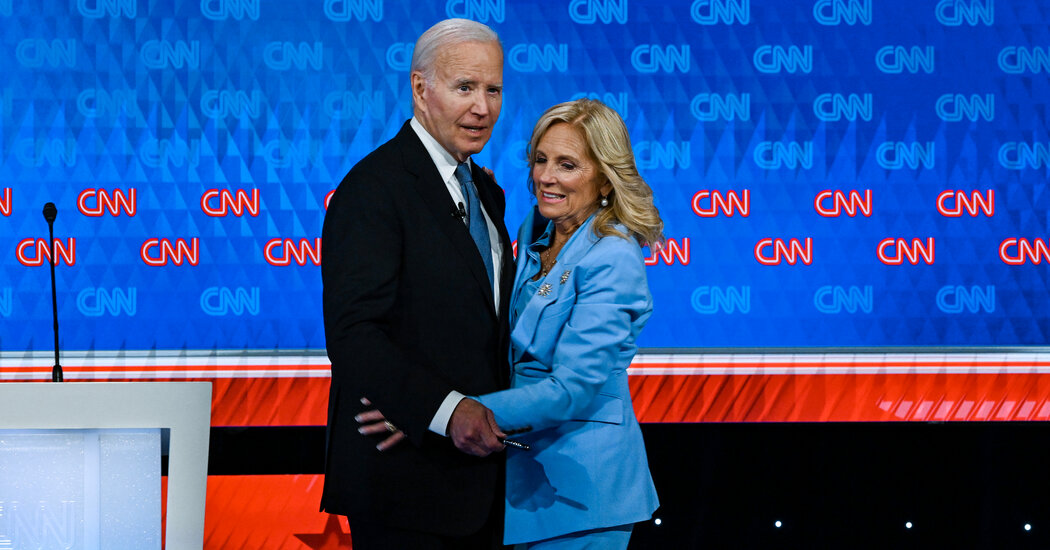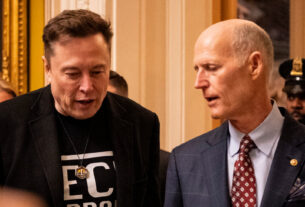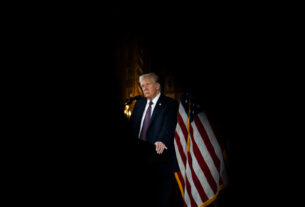In the aftermath of Thursday’s presidential debate, as Jill Biden led President Biden off the stage, former Senator Claire McCaskill, the Missouri Democrat, raised what she called a “hard and heartbreaking” question.
“You have to ask,’’ she said on MSNBC, “how did we get here?”
Barely seven weeks before Democrats gather in Chicago to formally nominate Mr. Biden for a second term, the Democratic Party is in crisis. Many party leaders, donors, activists and ordinary voters, stunned by the president’s faltering debate appearance, now fear he will lose to former President Donald J. Trump and drag Democrats to devastating defeats in congressional and state elections.
The answer to Ms. McCaskill’s question is a complicated mix of historical circumstance and structural deficiencies, a party struggling with ideological and generational fissures, and an aging Democratic president who spent his life battling for this job.
Mr. Biden is surrounded by a tight circle of longtime aides and family members who have encouraged his desire to seek a second term. But interviews with top party strategists, office holders and people close to Democrats seen as possible presidential hopefuls suggest that, just as crucially, party leaders were lulled into complacency or pressed to step in line at crucial moments when they might have persuaded Mr. Biden to step aside.
Many of them, including the president’s top aides, drew what could prove to be overly encouraging lessons from Mr. Biden’s victory against Mr. Trump in 2020, his run of policy victories as president and the party’s surprisingly strong showing in the midterm elections of 2022.
“It was the ’22 elections,” said David Plouffe, who was the senior adviser to President Barack Obama’s re-election campaign in 2012. “We’ve had three good elections in a row. The feeling was, ‘Let’s stay the course.’”
And some 50 years after the Democratic Party rewrote its rules to marginalize the role of political bosses, there was also no leader to step in and quietly prepare a Plan B. Other key Democratic figures who might have pressed Mr. Biden to consider retiring, or suggested an alternate plan, like Mr. Obama or Bill and Hillary Clinton, have moved on to their own post-White House lives and, operating outside Mr. Biden’s close circle of advisers, did not to appear to be in position to engage the Bidens in such a sensitive conversation.
At key moments, those who tried to sound the alarm about Mr. Biden’s potential weaknesses — among them David Axelrod, Mr. Obama’s chief strategist, and James Carville, who helped elect Bill Clinton in 1992 — were slapped down by Democrats, often in the brutal discord of social media sites like X, and chastised by top Biden aides for being disloyal.
Candidates who might have considered challenging Mr. Biden, after reviewing his weaknesses, yielded in the face of the threat of backlash from a party united behind its president. That also acknowledged the weight of history: Challenges to sitting presidents almost never succeed, and Mr. Biden had broad support among Democrats — particularly, until quite recently, with Black voters, a critical bloc.
“I said then, privately and publicly, if Biden ran he would be the nominee,” Mr. Axelrod said. “I felt a primary challenge would fail and only help Trump. I’m sure there were potential Democratic challengers who made the same calculation and didn’t want to jeopardize their futures by running and taking that risk.”
The situation is all the more striking because the Democratic Party, which has long positioned itself as a forward-looking party of the young, has what its operatives and activists view as the most robust class of next-generation leaders in a very long time.
Many are more seasoned than Mr. Clinton and Mr. Obama were when they won the White House: the governors Andy Beshear of Kentucky, Gavin Newsom of California, JB Pritzker of Illinois, Josh Shapiro of Pennsylvania and Gretchen Whitmer of Michigan; the House minority leader, Hakeem Jeffries of New York; the transportation secretary, Pete Buttigieg, and Vice President Kamala Harris, who won praise with a staunch post-debate defense of Mr. Biden.
“The Democratic bench has never been more stacked at the local, state, federal levels,” said Lis Smith, a senior party strategist. “We have so many talented next-generation mayors, governors, senators, congressmen and women and cabinet officials.
“We need to make a gentlemen’s agreement,” she added, “that 2024 is the last time we ask them to wait their turn.”
Even as Ms. McCaskill spoke on television after the debate, there were reminders of what could have been — and, in the hope of some Democrats, what still might be this year — as Ms. Harris, 59, and Mr. Newsom, 56, turned up in post-debate television coverage, making a better case for Mr. Biden than the president himself had made as he appeared, often frozen, opposite Mr. Trump.
“Those two people are signaling to a whole lot of Americans that are paying attention, ‘How come they’re not running?’” Ms. McCaskill said. “How come the Democratic Party doesn’t have them at the top of the ticket, instead of using them to shore up what have become, after tonight, some pretty glaring weaknesses in our president?”
A Come-From-Behind Win in 2020
In April 2019, Mr. Biden embarked on his third, and given his age, almost certainly his last, bid for the White House. After Mr. Obama’s two terms and Hillary Clinton’s failed 2016 campaign, many younger Democrats, the energetic grass roots of the party, were hungering for new talent.
Mr. Biden appeared to struggle on debate stages crowded with more progressive rivals, such as Senators Elizabeth Warren of Massachusetts and Bernie Sanders of Vermont, as well as younger and more engaging competitors, such as Mr. Buttigieg, then the mayor of South Bend, Ind., Ms. Harris and Senator Cory Booker of New Jersey among them. He finished poorly in Iowa and New Hampshire.
But he caught fire after his win in South Carolina, and his lead solidified as the Covid-19 pandemic raised his stock for Democrats looking for a more experienced hand to not only take the battle to Mr. Trump but also to guide the country through a crisis.
One prominent younger Democratic congressman, Ro Khanna of California, said Mr. Biden’s success in 2020, after he was written off by many voters as too old and out of touch, was a signal that more traditional parts of the Democratic base were not looking for generational change: They were seeking “a familiar face” after the “transformational” presidency of Mr. Obama and the disruption of Mr. Trump.
“The change candidates in the 2020 cycle lost,” Mr. Khanna said.
Mr. Biden’s surge to the nomination was an affirmation that emboldened him and the people around him, and it reinforced an instinct to ignore his critics and doubters. “You all declare me,” he told The New York Times editorial board in 2020, fumbling for words before finishing his thought: “declare me dead, and guess what, I ain’t dead, and I’m not going to die.”
Yet even then, Mr. Biden appeared to position himself as a transitional figure, an elder statesman who would defeat Mr. Trump and perhaps make way for a new generation of leaders — enhancing his appeal to younger voters who still wanted a change.
“I view myself as a bridge, not as anything else,” he said in March 2020. Campaigning with Ms. Harris, Mr. Booker and Ms. Whitmer, he referred to them as belonging to “an entire generation” of new leaders. They, he said, were “the future of this country.”
Potential Challengers Yield
After Mr. Biden’s election, some of his prospective successors made quiet moves preparing for potential 2024 campaigns in case Mr. Biden indeed decided to be a bridge, as he had said, and to step aside after one term.
Mr. Pritzker spoke in New Hampshire during his re-election campaign and donated to Democrats around the country. Mr. Newsom, after beating back a recall attempt in 2021, began raising his national profile, traveling and criticizing his party for not being forceful enough against Republicans, while being careful to talk up Mr. Biden.
The net effect was to lay the groundwork for a 2028 run while very discreetly positioning himself to be ready if Mr. Biden stood down in 2024. Mr. Newsom, associates said, never considered challenging Mr. Biden, which he made clear as White House officials began nervously tracking Mr. Newsom’s movements across the country.
But Mr. Biden showed little interest in retiring to Delaware. He scored a series of legislative wins — among them a $1 trillion bipartisan infrastructure bill and a $1.9 trillion package to help the nation deal with the Covid pandemic — that led to a wave of praise of his skills as chief executive, some comparing his accomplishments to those of Lyndon Baines Johnson.
Mr. Biden was also protected, in an unexpected way, by his choice of Ms. Harris as his vice president: Many Democrats thought she lacked the political skills and presence to lead a national ticket but believed it would be hard to deny the first Black woman vice president the top spot if Mr. Biden did not run again.
The congressional election of 2022 proved a pivot point. Again, Mr. Biden showed himself to be politically stronger than many Democrats had thought. Through the final weeks of the contest, some pollsters projected a “red wave” of big Republican gains in Congress. But Democrats defied those predictions.
Mr. Biden and his aides took the party’s surprisingly strong showing, even as they lost the House, as another sign of his popularity with voters. That, and the extent to which he was understimated by Washington elites, all but erased any chance he might step aside.
Also eliminated was any threat of a serious challenge from a younger Democrat.
“If we had had a disastrous ’22 election, yes, he might have had challengers,” Mr. Plouffe said. “But in the aftermath of ’22, there was a sense that ‘Biden can do this.’”
Quieting Early Concerns about Age
As he prepared for the general election, questions about Mr. Biden’s age and fitness for another four years as president were simmering beneath the surface. Mr. Biden and his top aides worked to stamp out discussion of those concerns, arguing that he was the only candidate who could have beaten Mr. Trump in 2020 and promising he could, and would, do it again.
One Democrat who was not convinced was Dean Phillips, a congressional representative from Minnesota. A distilling empire heir who also once headed the Talenti gelato company, with a $50 million net worth, Mr. Phillips warned that Mr. Biden’s age would prove disqualifying with voters. He won outsize attention when he said publicly in July of 2022 that he did not think Mr. Biden should seek re-election.
“I think the country would be well served by a new generation of compelling, well-prepared, dynamic Democrats to step up,” he said. Even after his comments drew harsh blowback from party activists, he told Politico, “If he were 15 to 20 years younger, it would be a no-brainer to nominate him, but considering his age, it’s absurd we’re not promoting competition but trying to extinguish it.” He was only saying publicly, Mr. Phillips insisted, what other Democrats were saying privately.
Mr. Phillips tried to enlist a more prominent Democrat to challenge Mr. Biden, reaching out to strategists for Ms. Whitmer and Mr. Pritzker, among others. As he told The Atlantic last fall, Ms. Whitmer’s aide was “very thoughtful,” and Mr. Pritzker’s was “somewhat unfriendly.” People close to Mr. Pritzker and Ms. Whitmer, speaking only on condition of anonymity, said the same thing: Neither ever would have considered a primary against Mr. Biden.
Finding no takers, Mr. Phillips launched his own campaign in October, one with little chance of achieving more than a larger statement about the party’s standard-bearer.
“The whole point of the Dean campaign, such as it was, was that he said the quiet part out loud,” said Steve Schmidt, a Never-Trump Republican turned Democrat who aided Mr. Phillips’s campaign.
A More Alarming Landscape
In November, a New York Times/Siena College poll found that Mr. Biden was trailing Mr. Trump in five of six key battleground states, with voters expressing deep concerns about the president’s economic policies and his age. Mr. Axelrod again raised questions about the president’s viability if he took on Mr. Trump.
“What he needs to decide is whether that is wise; whether it’s in HIS best interest or the country’s?” Mr. Axelrod wrote on X.
Mr. Axelrod drew fierce pushback from Democrats across the country, including from inside the White House. In his own post, Mr. Biden’s former chief of staff, Ron Klain, noted that Mr. Axelrod had referred to Mr. Biden as “Mr. Magoo” in 2019. And word leaked that Mr. Biden had vented about Mr. Axelrod in salty language.
For Democrats surveying a landscape that, after the debate, looks even more alarming than it did in November, it is hard not to wonder what might have been had someone persuaded Mr. Biden not to run.
That would have opened the way for the party’s newer stars to become known by the public and undergo the kind of on-the-ground vetting that a contested primary provides.
But the decision was Mr. Biden’s. Whatever his weaknesses as a general-election candidate, he dominated the primary field. He was the president. He was the party’s unrivaled leader. And, as he and his aides repeated, he had proved his doubters wrong in 2020 and 2022.
“There was no D.N.C. committee that came to candidates and said, ‘Do not run,’” Mr. Khanna said. “If there was any Democrat who thought they could become the nominee, they would have run.” Instead, he added, those would-be candidates concluded that “nobody is beating Joe Biden in a Democratic primary.”
Hindsight casts those conclusions in a new light. Yet for now, Mr. Biden is holding on to the support of many leading Democrats, particularly those of his generation, for the very reason that they stood behind him at critical junctures over these past two years.
“We had an incumbent president who has the best record since F.D.R. on the economy and who is a very compassionate man,” said Barbara Boxer, the former Democratic senator from California. “Of course we are going to stick with that.”





